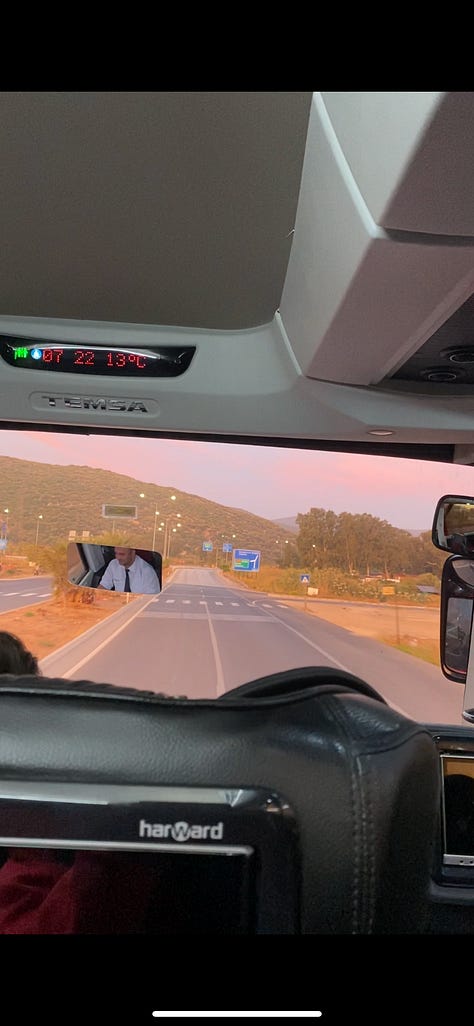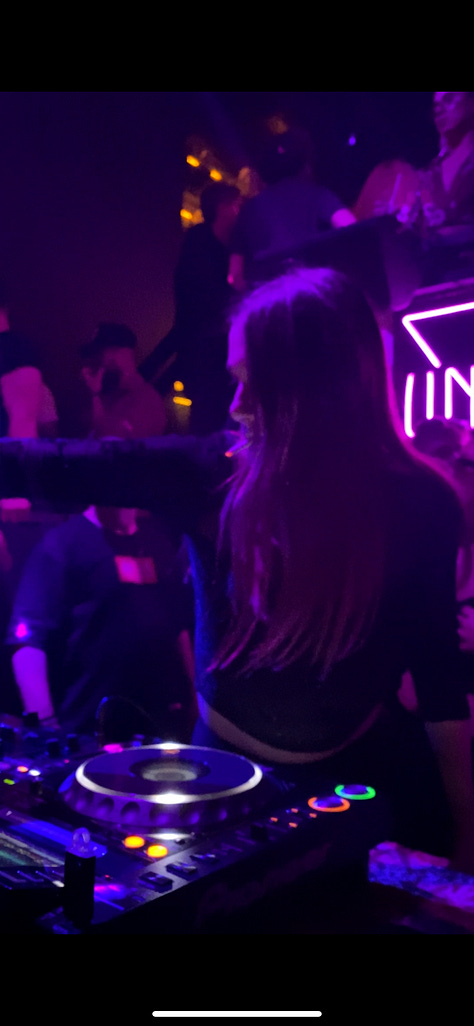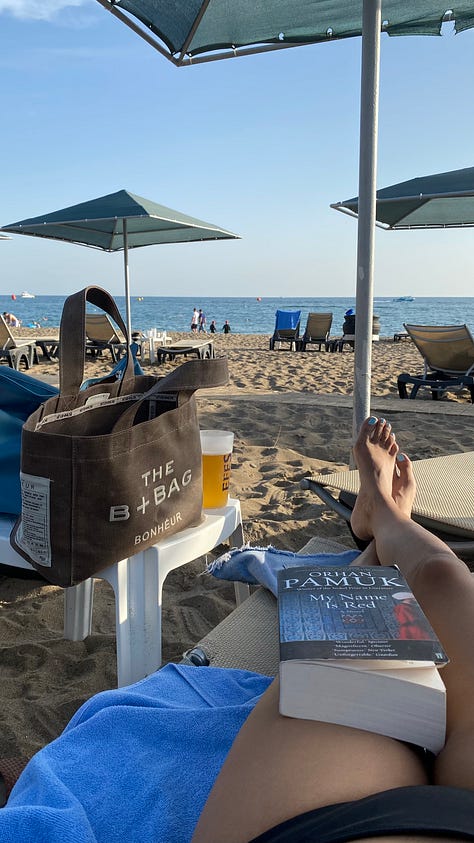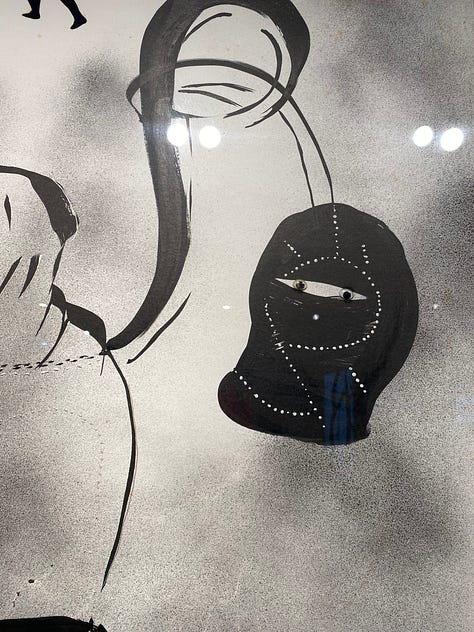türkiye: where binaries burst
Cut between continents, suspended between blue history and crimson politics, here are my field notes from Istanbul, Çesme, and Antalya.
Our first few days in Istanbul, where thousand-year-old stones and sites are cluttered next to ATMs and 3-star hotels, we considered how we thought of the global past. There is an idea of the Old: marble columns, coastal balustrades, Romantic paintings, and gold-encrusted parlour furniture. An idea of Old that is Greco-Roman, Palais de Versailles, Parthenon-chic and Florentine. By the force of its certainty, its singular elegance, and its hegemonic violence, this idea of Old casts all others as fictive, immature, mythical, and exotic. We considered: how did Turkey – Türkiye – disrupt this past? Straddling Asia and Europe, populated by mosques and churches, covered women and cropped-top kids, it was alive with its cities, and haunted by its empires. From the assonance of words themselves (Ot-to-man, Ha-gi-a, Me-ne-men), Turkish pasts resembled more closely a vivid storybook I might’ve read in my childhood – with Princesses, jasmine, and an alto voice humming Arabian Nights. A Mughal-adjacent reverie. Out of force of habit, our eyes fit history into a gaze of fetish. Domes shone blue like Disneyland, minarets loomed like myths.
Each night, we watched the moon wax bigger and bigger, bright like I’d never seen it before, soaking Istanbul’s waterways in deep purple and white gold. How could the moon be so different here, beaming like a metaphor? We googled it. Islam was born in Arabia by moonlight, through the desert, where its guidance in the night sky led people to their destinations – like God in dark lives. Now, crescents flew on flags, cradling their civilizations. Against ‘Eurocentric’ tellings of history, which manufactured and repurposed the so-called ‘East’ for its own thrill, here was an empire, a slit between continents and crusades, a capital that was once the centre of the silken world. There was, of course, no Rome without Constantinople, no sumac without these straits. My 3-week trip revelled in splendid, grimed moments that neither compacted into clear days nor stayed separate from navy, laser nights. Bursting its binaries, welcome to my travelogue, my fieldwork, my diary of Türkiye.
Tourism versus Localism
The first half of my trip was spent budget travelling with an old friend. We knew that the true tourist experience meant avoiding tourist traps. And yet we also knew that there was something politically voyeuristic and frankly, annoying, to spend a week in a city trying to be locals. Like many ethnographic tests, this conflict played itself out over the 3 nights I spent in bars or clubs in the country. There was first a night in local Istanbul, then one in hyperlocal Çesme, and finally, a flagrantly touristic one in Istanbul again.
On our first Friday night in the city, after 60 lira Efes beers at a rock n’ roll bar, we asked our server-turned-friend if she would direct us to some clubs. What kind of music, she asked? Whatever you recommend, we said. At midnight, we entered the first club. The bouncers asked for Student IDs and not passports, and we thankfully supplied ours (I’m still young, I thought, I was an undergraduate just a few months ago). The large venue was filled with big groups of friends, talking as they danced, drinking cheap shots and enjoying the Turkish pop and rap that played manageably loudly. About an hour in, after a couple of 100 lira shots, I realised I was listening to Pitbull’s ‘Hotel Room Service’ - dubbed entirely in Turkish. I found this unspeakably funny. The club was comforting because it was filled with students who barely spoke English and anyway seemed more interested in their circles than in us. There was an ease to the green smoke and dubbed throwback bangers, a veritably authentic yet familiar feeling of late-night abandon that came from seeing circles of friends, doing their weekend rituals. (The situation could be best described as sweet: when I told a boy who’d been holding up Google translate and half a finger heart for the past hour that we were leaving, he fell to his knees and immediately confessed his love for me. I think they were the only three English words he knew.)
Buoyed by this early success, we made it to the next club, which opened only at 2 am, and took a hefty entry fee. There were, once again, only locals – but of diverse ages and races, some presenting as queer, all of whom were semi-lit by the purple shadows of the pelt-like techno music. Heads swayed crooked at the neck, hands cut dry ice machines with juts. Almost immediately, we were offered drinks and dates. More English was spoken here, but somehow, less was being said. I met civil engineers, wives, businesspeople, and other professions that melted away in the din. As my friend and I tried to reach the base of the DJ booth and dance, we were stopped, approached, and talked at. The small area of the bar felt even smaller when we tried to dance, as the space and city overpowered us. The sound of an unfamiliar language twisted my ears with anxious malaise. From the upper deck, people (mainly men) looked down at us and waved, and I wondered how young we must’ve looked, 5’nothing and disoriented by attention.
That’s the thing about travelling ‘local’ - you dive into immersion, and then panic at being underwater. This panic reached its peak in Çesme, a sparsely populated beach town at the Westernmost tip of Turkey, separated from Greece by just a few nautical miles. Perhaps during tourist season it came alive, but there, in shoulder season, we felt like the only tourists in a many kilometer radius. We’d taken the bus there from Istanbul, and after a sleepless night spent watching people filter out of the bus steadily, only three people were getting off at this town. But initial worry soon gave way to beauty, as we made it to our hotel at sunrise with the world bathed in nubile pink skies and yawns of clouds. The town was flush with settlements in white and blue, its little lanes forming veins canopied in fuchsia bougainvillaea. The souvenirs, like the people and the raki, bore much resemblance to Greece. We spent the day at the beach burying into sand, making friends through strangeness, and showing off a swimsuit that screamed My Name Is Red. At night, after downing spinach leaves with yogurt, cheese kumrahs and sheesha, we left the coastal restaurant partially in search of music, partially to get away from a man sat at a table next to us, who’d been pouring raki into our water glasses and asking for a dance. He had been interrupting our psychoanalytically laced conversations about our mothers, and while we wanted to meet residents, we decided they had better not be men. We’d had just about enough of being placed in the center of a cultural panopticon.
With our ears to the ground searching for a good bassline, we found a bar with live music and made friends with some girls, twirling and giggling in secret complicity. After it shut, we walked around, watching the town fold into itself, hyperlocal and endogamous like a bygone era. Everybody seemed to know everybody else, and unlike Istanbul, people here looked and dressed similarly. We ended the night with our new friends and some guys they knew, sipping beers and emboldened to ask burning political questions: what of class, what of the refugee crisis, what of Erdogan, and what of Palestine. When we woke up the next morning, our hotelier said he’d been waiting up to make sure we got home safely, but after 2 am he had given up and hoped for the best. Çesme had been so intact in itself that it was hard not to feel alienated and frightened, but it was also ~ethnographically~ a dream site. It was there that I heard from local lips of the fractious dynamics of refugees, secular disillusionment, and the drain of the young from the country.
Finally, my last experience was made possible by Turkish Airlines, who kindly cancelled my flight and didn’t tell me when the next one would be. I left that airport with a bag full of dirty clothes, no liras left, and a brain that reeked of too much living. Two nights later, I went on a bar crawl at a friend’s hostel in Istanbul. Immediately, it felt different from my whole trip up until that point. The hostel itself was hardly a hostel, with sleek neon lights, sanitized white walls, and digital nomad décor. At the bar, about 20 traveller-types got to know each other before we took off. These travelers didn’t just take loads of vacations, they settled in places for weeks or months and treated an atlas like a bucket list. When you told them you’re from India, instead of getting a vague, joyous, “Sharukh Khan!” you got things like, “oh, I’m coming to Goa for Sunburn in December.” That night, there was no language barrier, and no pressure to creep up inside of culture’s skin. Instead, we could discuss the city – treating it like a construct – over banter and exchanged Instagrams. You could complain about the over-friendly men or the poorly-designed system of public transport. I was no longer playing ethnographer, swabbing surfaces for insight. Istanbul was only one city in one country; we could stack it against others, weigh its pros and cons, and look at it – wide-eyed and safe – from the outside.
Between the grimey bars and the luxury resorts, deciding who to kiss and where to eat, this dichotomy of tourism versus localism reduced itself to redundance. You just have to do both. I sang Oasis with the tourists coming home from the bar crawl, talked football with Galatasaray heads in Taksim, and used the backdrop of unfamiliarity to break new ground in relationships with people I’ve known all my life. I told my mother about my emotional unavailability, and heard from a stranger about their lost love in Viet Nam. Sometimes the 300 lira Stan Sebastian cheesecake is worth the line, sometimes the 1000 lira breakfast is neither worth the seagulls nor the selfie sticks. Should you try to plumb at an underbelly or take only what is made available to the outside? Bad question. As a field worker, Instagram fiend, and an experience junkie, there is euphoria in treating a city like a dream, and there is honesty in trying to taste its truths.
Past versus Present
To travel is to visit in the moving present, a country’s pasts. In Türkiye, however, as Gaza burned, when people spoke of “with everything that’s going on right now,” there was neither geographical distance nor secondhand empathy – Israel’s war crimes seemed to breathe and bellow here, in mainstream media and graffiti. Rather than represent a countercultural narrative as in the US, UK or India, next to the many distinctive, red Turkish flags strung on skies, Palestinian flags flew high. Cafés, trams, and shops featured people listening to the news of Israel’s latest offences out loud. I held up Google Translate to words on walls, and read lines like ‘our fight is one, solidarity with Gaza’ and cruder, blunter, ‘Israel Baby Killer.’ Protests coagulated in lanes like open, crimson wounds. Hundreds of police stood at junctions like buff black ants. I even saw shop owners with signs that said Israeli citizens were not welcome so long as the violence endured.
Meanwhile, the West pushed wildly irresponsible and morally repugnant ‘news’ in The Atlantic and The Times and in general on the internet. I shouldn’t have been surprised, but I was, because not only was their position untenable, their strategies of media manipulation and propaganda were so cold and clear. (Twitter was a hellscape of death tolls, a postmodern badland where misinformation and information fought battles in Community Notes). Türkiye is one of the few countries in the world whose humanitarian aid to and recognition of Palestine has been consistent and supplemented by state rhetoric. Yet, things are more complicated than ‘their government chose the right side.’ Head of state Erdogan was accused of attempting to pander to his Islamic vote bank. People also called the timing of his attendance at a pro-Palestinian protest suspect, because it was just before the country celebrated its centenary – the anniversary of its 100 years as a secular republic, following the collapse of the Ottoman Empire. The founding vision of a secular Türkiye, devised by Mustafa Ataturk, crashed into the conservative platform of its current President, Erdogan. Discussing politics in a small town late into the night over beers, my friend and I had asked a group of twenty-somethings what they thought of Ataturk: “he is like our God,” they said, adding that many of their friends had his signature tattooed on their arms. (I promptly bought a 100-lira baby tee of Ataturk for good measure).
Famously, Erdogan barely mentioned Ataturk’s name and had overturned most of his secular policies – which were once the lifeblood of the newly-minted state. In his time in power, Ataturk had banned headscarves in school, replaced the Arabic alphabet with the Latin script, and dreamed up a secular, modern Turkey. These are big, valent words. And yes, they are ‘Western’ words. But as my friend and I stood at the entrance of the Hagia Sofia, a church turned into a mosque, then turned into a museum by Ataturk, then turned back into a mosque by Erdogan, we murmured about what it meant to honour complicated histories. The new post-Erdogan inscriptions skirted over the structure’s proselytizing past, and veered quite close to propaganda.
To visit a historical site is to visit an active site of political editing. Each new government retelling of the past is part of a project to create a certain kind of political imaginary. Türkiye’s poetry of bringing together Europe and Asia, East and West, had translated in fact to a population that seemed rawly discontent with their lack of formal Europeanness. They simmered as they were asked to accept crippling inflation, increasing authoritarianism, and internal polarization. Their mythologies had failed them, and now young people were leaking into other waters, born into a citenzry of disillusionment.
This was a government, like my own, that was buckling over its past, and sacrificing its present to force itself a future. People, however, cannot be bent as easily as a story. They feel the past more clearly than the future, and will not accept by default the present. There we were, watching binaries inflated into balloons for the ballot, pierced by the grit of real life. Standing on a bridge, I could see continental waters below and flags of watermelon and crescent above. I heard, between chants I didn’t understand, one that I did: from the river to the sea.
When You Leave, Who Do You Take Home?
Once at a sleepover with a friend, splayed on the floor with legs dangling in the air, I remarked, “I think my favourite thing to do is set up a concept in a binary, and then burst it.” The false binary. It was a common trick of academia, a beloved rebuttal of debaters, and an age-old Whitmanian truism. Yes, of course, things are large, they contain multitudes. But the trouble is that we cannot help but think in our little dichotomies. An expectation, crystal and cerebral, versus a reality, fleshy and opaque. We encounter the world through the interplay of binaries - against the past, we measure the present. Against the local aesthetic, we scurry to build a touristic one. Against the self we make in our homes with our routines, out comes the traveller, cigarette in lips and diet gone to shit. Türkiye drove me wild in its twilight modernity, hushed me in its mosques by moonlight, and left my head spinning like I was at sea for days after. It made me nostalgic for past selves, and conscious - conscious like a conqueror - of infinite new selves that could become in this big world, across a border and a binary or two.
Shop like a tourist, eat like a local, see like a child, and write like an alien. Somewhere between these edicts, friendships form, senses tingle, and through estrangement, culture becomes as clear as it will ever be.








